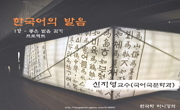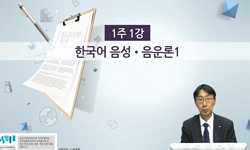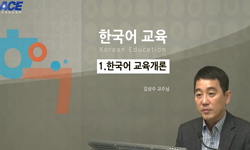This study examined how ideologies and value systems in the Korean context affected the identities of four Mongolian students from a poststructuralist perspective. Adopting the Douglas Fir Group (DFG, 2016) framework, the data analysis revealed ideolo...
http://chineseinput.net/에서 pinyin(병음)방식으로 중국어를 변환할 수 있습니다.
변환된 중국어를 복사하여 사용하시면 됩니다.
- 中文 을 입력하시려면 zhongwen을 입력하시고 space를누르시면됩니다.
- 北京 을 입력하시려면 beijing을 입력하시고 space를 누르시면 됩니다.

Mongolian University Students in the Korean Academic Context: Ideologies in the Target Language Community, Their L2 Identities, and Investments
한글로보기https://www.riss.kr/link?id=A105945329
- 저자
- 발행기관
- 학술지명
- 권호사항
-
발행연도
2018
-
작성언어
English
-
주제어
Korean ; ideology ; racialization ; identity ; investment ; community of practice ; Mongolian ; 한국어 ; 이데올로기 ; 정체성 ; 몽골인 유학생 ; 차별 ; 언어공동체
-
등재정보
KCI등재
-
자료형태
학술저널
-
수록면
1-46(46쪽)
-
KCI 피인용횟수
0
- DOI식별코드
- 제공처
-
0
상세조회 -
0
다운로드
부가정보
다국어 초록 (Multilingual Abstract)
This study examined how ideologies and value systems in the Korean context affected the identities of four Mongolian students from a poststructuralist perspective. Adopting the Douglas Fir Group (DFG, 2016) framework, the data analysis revealed ideologies that emerged at the macro level—the Korean students’ expectation for foreign students to have a good command of English and viewing Asian minority students from less socio/economic developed countries as academically less intelligent and competent than themselves—and exposed unequal power structures, marginalizing the Mongolian students. Nonetheless, these minority students were active investors in their academic careers based on their previous positive academic self-image as learners, and were thus able to negotiate new identities. The findings indicate that socially constructed identities and ideologies were challenged through dynamic learner agency. Interestingly, besides Korean which was the target language, English competence was also identified as having power to impose reception even for these Asian students in the Korean context.
참고문헌 (Reference)
1 장동진, "외국인노동자와 한국 민족주의 : 자유주의적 민족주의를 통한 포용 가능성과 한계" 21세기정치학회 17 (17): 231-256, 2007
2 안상원, "외국인 유학생들의 비평적 글쓰기 지도사례 연구-이화여자대학교 2015학년도 2학기 <우리말과글쓰기> 교과를 중심으로" 우리문학회 (53) : 319-357, 2017
3 임도경, "대학생들의 다문화 인식 및 선행요인에 관한 연구 : 사회적 거리감, 외국인 이미지, 한국인 인정조건을 중심으로" 한국커뮤니케이션학회 19 (19): 5-34, 2011
4 이명진, "다문화사회와 외국인에 대한 사회적 거리" 한국조사연구학회 11 (11): 63-85, 2010
5 Taylor, L., "Wrestling with race : The implications of integrated antiracism education for immigrant ESL youth" 40 (40): 519-544, 2006
6 Han, E. -J., "Uncovering the hidden power of language : critical race theory, critical language socialization and multicultural families in Korea" 44 (44): 108-131, 2015
7 Park, J. S., "Two processes of reproducing monolingualism in South Korea" 2 (2): 331-346, 2008
8 Eckert, P., "Thinking practically and act locally : language and gender as community-based practice" 21 : 461-490, 1992
9 Block, D., "The rise of identity in SLA research, post Firth and Wanger(1997)" 91 (91): 863-876, 2007
10 Park, J. S., "The politics of English: South Asia, Southeast Asia and the Asia Pacific" John Benjamins 287-302, 2013
1 장동진, "외국인노동자와 한국 민족주의 : 자유주의적 민족주의를 통한 포용 가능성과 한계" 21세기정치학회 17 (17): 231-256, 2007
2 안상원, "외국인 유학생들의 비평적 글쓰기 지도사례 연구-이화여자대학교 2015학년도 2학기 <우리말과글쓰기> 교과를 중심으로" 우리문학회 (53) : 319-357, 2017
3 임도경, "대학생들의 다문화 인식 및 선행요인에 관한 연구 : 사회적 거리감, 외국인 이미지, 한국인 인정조건을 중심으로" 한국커뮤니케이션학회 19 (19): 5-34, 2011
4 이명진, "다문화사회와 외국인에 대한 사회적 거리" 한국조사연구학회 11 (11): 63-85, 2010
5 Taylor, L., "Wrestling with race : The implications of integrated antiracism education for immigrant ESL youth" 40 (40): 519-544, 2006
6 Han, E. -J., "Uncovering the hidden power of language : critical race theory, critical language socialization and multicultural families in Korea" 44 (44): 108-131, 2015
7 Park, J. S., "Two processes of reproducing monolingualism in South Korea" 2 (2): 331-346, 2008
8 Eckert, P., "Thinking practically and act locally : language and gender as community-based practice" 21 : 461-490, 1992
9 Block, D., "The rise of identity in SLA research, post Firth and Wanger(1997)" 91 (91): 863-876, 2007
10 Park, J. S., "The politics of English: South Asia, Southeast Asia and the Asia Pacific" John Benjamins 287-302, 2013
11 Kim, A., "The language socialization and identity negotiations of generation 1. 5 Korean-Canadian university students" 81 (81): 81-102, 2012
12 Norton, B., "The encyclopedia of applied linguistics" Wiley–Blackwell 2013
13 Statistics Korea, "The current status of student studying abroad in Korea"
14 심두보, "The Language Politics of “English Fever ” in South Korea" 한국학중앙연구원 48 (48): 136-159, 2008
15 Dörnyei, Z., "Teaching and researching motivation" Pearson Education 2001
16 Pavlenko, A., "Sociocultural Theory and Second Language Learning" Oxford University Press 157-180, 2000
17 Park, M. Y., "Resisting linguistic and ethnic marginalization : Voices of Southeast Asian Marriage-migrant women in Korea" 17 (17): 118-134, 2017
18 Shin, H-J., "Researching language and neoliberalism" 37 (37): 443-452, 2016
19 Dörnyei, Z., "Research methods in applied linguistics" Oxford University Press 2007
20 Grant, R., "Race, culture, and identity in second language education:Exploring critically engaged practice" Routledge 44-63, 2009
21 Kubota, R., "Race, culture, and identity in second language education:Exploring critically engaged practice" Routledge 1-24, 2009
22 Sung, C., "Race and native speakers in ELT : Parents’ perspectives in Hong Kong" 27 (27): 25-28, 2011
23 Merriam, S. B., "Qualitative research: A guide to design and implementation" Jossey-Bass 2009
24 Pavlenko, A., "Portraits of the L2 user" Multilingual Matters 275-302, 2002
25 Piller, I., "Neoliberalism as language policy" 42 (42): 23-44, 2013
26 Morita, N., "Negotiating participation and identity in second language academic communities" 38 (38): 573-603, 2004
27 Lantolf, J., "Learner Contributions to Language Learning: New Directions in Research" Longman 141-158, 2001
28 Jackson, J., "Language, identity and study abroad: Social cultural perspectives" Equinox 2008
29 Miller, J., "Language use, identity, and social interaction: Migrant students in Australia" 33 (33): 69-100, 2000
30 Bayley, R., "Language socialization in bilingual and multilingual societies" Multilingual Matters 1-6, 2003
31 Vasiloupoulos, G., "Language learner investment and identity negotiation in the Korean EFL context" 14 (14): 61-79, 2015
32 Woolard, K., "Language ideologies: practice and theory" Oxford University Press 3-47, 1998
33 Pomerantz, A., "Language ideologies and the production of identities:Spanish as a resource for participation in a multilingual marketplace" 21 (21): 275-302, 2002
34 Bourdieu, P., "Language and symbolic power" Polity Press 1991
35 Gao, F., "Language and power : Korean-Chinese students’ language attitude and practice" 30 (30): 525-534, 2009
36 De Costa, P., "Introduction: Identity, transdisciplinary, and the good language teacher" 101 (101): 3-14, 2017
37 Lee, H. -K., "International marriage and the state in South Korea : Focusing on governmental policy" 12 (12): 107-123, 2008
38 Cervatiuc, A., "Identity, good language learning, and adult immigrants in Canada" 8 (8): 254-271, 2009
39 Hsieh, M. H., "Identity development of East Asian female international students with implications for second-language higher education" 127 (127): 2006
40 Norton, B., "Identity and language learning: Gender, ethnicity, and educational change" Longman 2000
41 Norton, B., "Identity and language learning: Extending the conversation" Multilingual Matters 2013
42 Darvin, R., "Identity and a model of investment in applied linguistics" 35 : 35-36, 2015
43 Ladson-Billings, G., "Foundation of critical race theory in education" Routledge 17-36, 2009
44 Weedon, C., "Feminist practice and poststructuralist theory" Basil Blackwell 1987
45 Miller, E., "Exploring language teacher identity work as ethical self-formation" 101 (101): 91-105, 2017
46 Thomas, J., "Cross-cultural pragmatics failure" 4 (4): 91-112, 1983
47 Zamudio, M. M., "Critical race theory matters: Education and ideology" Routledge 2006
48 Litowitz, B., "Contexts for learning" Oxford University Press 184-196, 1993
49 Wenger, E., "Communities of practice" Cambridge university Press 1998
50 Gillborn, D., "Coincidence or conspiracy? Whiteness, policy and the persistence of the black/white achievement gap" 60 (60): 229-248, 2008
51 Heller, M., "Children's Ethnic Socialization" Sage 1987
52 Pavlenko, A., "Autobiographic narratives as data in applied linguistics" 28 (28): 163-188, 2007
53 Du, H., "American college students studying abroad in China : language identity, and self-presentation" 48 (48): 250-266, 2015
54 TOPIK, "About TOPIK"
55 Douglas Fir Group., "A transdisciplinary framework for SLA in a multilingual world" 100 (100): 19-47, 2016
56 Ministry of Education, Science, & Technology, "A scheme for increasing the number of international students in Korea"
동일학술지(권/호) 다른 논문
-
고등학교 『중국 문화』의 어휘 선정 및 제시에 관한 적합성 연구
- 한국외국어대학교 외국어교육연구소
- 김미순
- 2018
- KCI등재
-
연극을 활용한 한국어교육 연구 - 수업 운용 방안을 중심으로 -
- 한국외국어대학교 외국어교육연구소
- 노채환
- 2018
- KCI등재
-
- 한국외국어대학교 외국어교육연구소
- 김정은
- 2018
- KCI등재
-
플립드 러닝을 적용한 한국어 교육이 학습자의 자기효능감에 미치는 효과: 해외 대학 한국어 수업을 중심으로
- 한국외국어대학교 외국어교육연구소
- 한혜민
- 2018
- KCI등재
분석정보
인용정보 인용지수 설명보기
학술지 이력
| 연월일 | 이력구분 | 이력상세 | 등재구분 |
|---|---|---|---|
| 2028 | 평가예정 | 재인증평가 신청대상 (재인증) | |
| 2022-01-01 | 평가 | 등재학술지 유지 (재인증) |  |
| 2019-01-01 | 평가 | 등재학술지 유지 (계속평가) |  |
| 2016-01-01 | 평가 | 등재학술지 선정 (계속평가) |  |
| 2015-01-01 | 평가 | 등재후보학술지 유지 (계속평가) |  |
| 2013-01-01 | 평가 | 등재후보 1차 FAIL (등재후보1차) |  |
| 2012-01-01 | 평가 | 등재후보학술지 유지 (기타) |  |
| 2011-01-01 | 평가 | 등재후보 1차 FAIL (등재후보1차) |  |
| 2010-01-01 | 평가 | 등재후보학술지 유지 (등재후보2차) |  |
| 2009-01-01 | 평가 | 등재후보 1차 PASS (등재후보1차) |  |
| 2007-01-01 | 평가 | 등재후보학술지 선정 (신규평가) |  |
학술지 인용정보
| 기준연도 | WOS-KCI 통합IF(2년) | KCIF(2년) | KCIF(3년) |
|---|---|---|---|
| 2016 | 0.47 | 0.47 | 0.42 |
| KCIF(4년) | KCIF(5년) | 중심성지수(3년) | 즉시성지수 |
| 0.38 | 0.37 | 0.843 | 0.05 |





 KCI
KCI KISS
KISS






